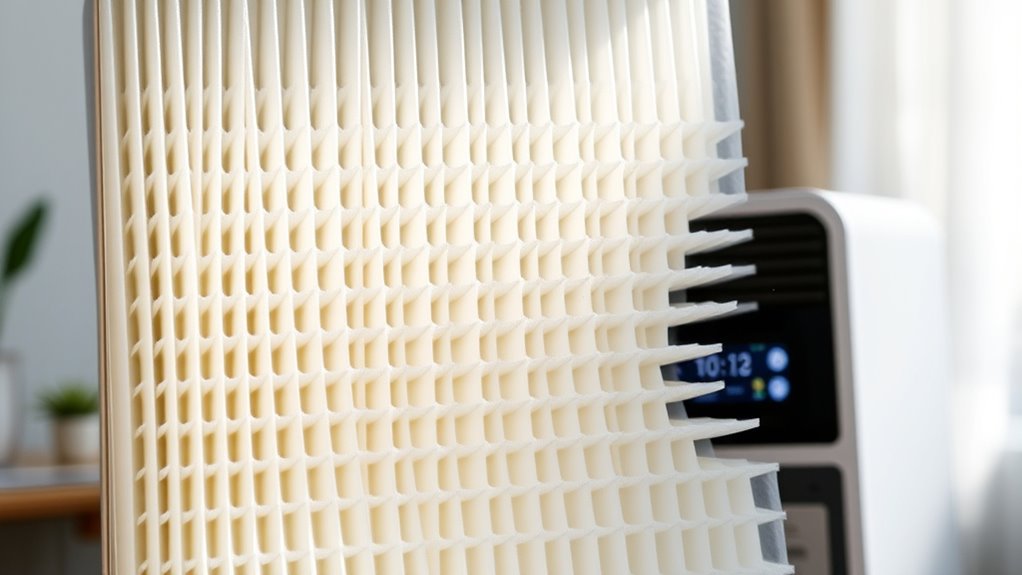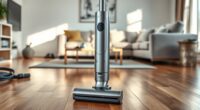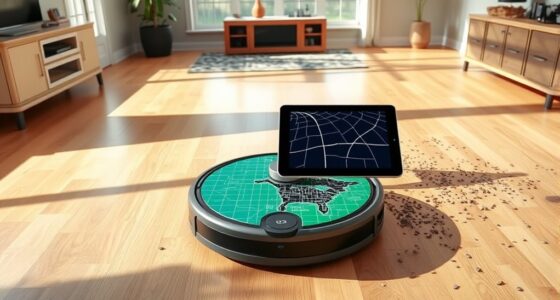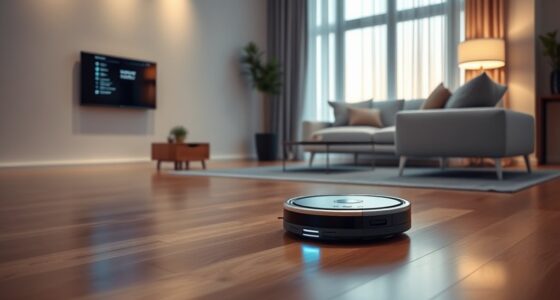HEPA filters are highly effective at capturing tiny particles like allergens, dust, pet dander, mold spores, and bacteria, greatly improving indoor air quality. Regular maintenance and timely replacements are essential, as clogged filters reduce performance and can strain your HVAC system. Whether you need one depends on your environment and health concerns, but understanding proper filter use can make a big difference. Keep going to learn more about how HEPA filtration can benefit you.
Key Takeaways
- HEPA filters effectively capture tiny airborne particles like allergens, dust, mold spores, and some bacteria, improving indoor air quality.
- Regular maintenance and timely replacement (every 6-12 months) are essential for HEPA filters to remain effective.
- Proper filter upkeep reduces indoor pollutants, allergens, and respiratory irritants, benefiting allergy sufferers and asthma patients.
- Neglecting filter maintenance can decrease filtration efficiency, increase energy costs, and compromise indoor air health.
- Using a HEPA filter is most beneficial when combined with good ventilation and overall indoor air management practices.

Have you ever wondered how HEPA filters can dramatically improve indoor air quality? If you’re concerned about the air you breathe every day, understanding how these filters work can make a big difference. HEPA, or High-Efficiency Particulate Air filters, are designed to capture tiny particles that often go unnoticed but can impact your health. When properly used, they can greatly reduce allergens, dust, pet dander, mold spores, and even some bacteria. This improvement in air quality can be especially important if you suffer from allergies, asthma, or respiratory issues. But it’s not just about having a HEPA filter; it’s also about maintaining it properly to guarantee it performs at its best.
Filter maintenance is vital when it comes to keeping your indoor air clean. A HEPA filter doesn’t last forever; over time, its ability to trap particles diminishes. When the filter becomes clogged with debris, it can restrict airflow, making your HVAC system work harder and less efficiently. This not only wastes energy but also reduces the filter’s effectiveness, allowing more pollutants to circulate in your home. Regularly checking and replacing your HEPA filter as recommended by the manufacturer guarantees you’re consistently getting the maximum air quality benefits. Neglecting filter maintenance can lead to a buildup of contaminants, which defeats the purpose of having a HEPA filtration system in the first place. Additionally, understanding filter replacement intervals can help ensure optimal performance and air quality.
Maintaining your filter is straightforward but essential. Typically, HEPA filters should be checked monthly, especially if you have pets, smokers, or live in a highly polluted area. When it’s time to replace the filter, do so promptly—usually every 6 to 12 months, but always follow the manufacturer’s guidelines. Proper filter maintenance not only preserves air quality but also extends the lifespan of your HVAC system, saving you money in the long run. Additionally, keeping the area around your air intake clean can prevent dust and debris from bypassing the filter, further improving indoor air quality.
Frequently Asked Questions
Can HEPA Filters Remove Viruses Effectively?
HEPA filters can effectively remove viruses during air purification, thanks to their ability to trap tiny particles. When you use a HEPA filter, you enhance virus removal from your environment, reducing airborne health risks. While they don’t eliminate every virus instantly, they considerably lower the concentration of airborne pathogens. For better protection, combine HEPA filtration with good ventilation and other health measures to guarantee cleaner, safer air around you.
How Often Should HEPA Filters Be Replaced?
When it comes to HEPA filter lifespan, you can’t just set it and forget it. Typically, you should replace filters every 6 to 12 months, but this depends on usage and air quality. Regular replacement is key to maintaining peak performance. Keep an eye on the filter’s condition, and don’t wait until it’s visibly dirty—think of it as keeping your home in tip-top shape, not throwing good money after bad.
Are HEPA Filters Suitable for All Allergy Types?
You might wonder if HEPA filters suit all allergy types. They’re highly effective at capturing airborne particles like pollen, pet dander, and dust mites, making them suitable for many allergy sufferers. However, if your allergy is caused by chemicals or odors, HEPA filters alone may not be enough. Always consider your specific allergy types and check the filter’s effectiveness for those triggers before choosing a filtration system.
Do HEPA Filters Produce Ozone or Other Harmful Emissions?
Imagine a quiet room where you breathe easy—HEPA filters don’t produce ozone emissions or harmful chemicals. Unlike some air purifiers that emit ozone, HEPA filters trap particles without adding pollutants. A study shows most HEPA systems are ozone-safe, making them a reliable choice. So, you won’t have to worry about harmful emissions from your filter, just clean, fresh air.
What Is the Cost Comparison Between HEPA and Other Filters?
When comparing filter expenses, HEPA filters tend to be more costly than basic filters like foam or pre-filters, mainly due to their higher efficiency. The cost comparison shows that HEPA filters may require more frequent replacement or higher upfront investment. If you’re on a budget, consider lower-cost options, but keep in mind that higher-quality filters like HEPA can improve air quality markedly, justifying their higher price.
Conclusion
Now that you know the truth about HEPA filtration, you can make smarter choices for your air quality. Think of it like installing a medieval knight’s shield—protecting you from harmful invaders. Not everyone needs a full suit of armor, but understanding when HEPA filters are necessary can save you from unnecessary expenses. So, whether you’re battling dust or allergens, remember: knowledge is your best weapon—no need to summon a dragon when a trusty sword will do.









